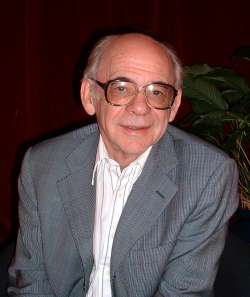
The short story is apparently an endangered form: publishers refuse to publish them because they say that readers won't buy them. But when Durham Literature Festival offered the opportunity to hear not one but five short stories, it attracted a large and enthusiastic audience. The event brought together some of the short story's strongest defenders: Radio 4, who were recording the evening's stories, and whose output includes a steady flow of short stories, New Writing North, represented by Claire Malcolm, who acted as host for the event, and the authors themselves, who clearly enjoy creating narratives at short story length. This seems to be particularly true of the North East of England, where the enthusiasm of writers for the form led to the setting up, as Claire Malcolm pointed out, of the Save Our Short Story campaign, and where small publishers like Comma Press are producing collections such as their Newcastle Stories and collections by Sean O'Brien and David Constantine.

First on stage was Alan Plater, reading his story A Short Walk On The Cutting Edge, in which a writer not unlike himself, nettled by a critic's remark that nothing happens in his stories, ventures out into the border country of Islington, "where the worst of Sunderland or Hartlepool meets the best of Cheltenham or Harrogate." His search for adventure - as represented by the alliterative trio of the bar, the blonde and the bad guy - takes him into an unwelcoming wine bar; the spirit of Raymond Chandler would surely have approved of the description of the waiter approaching "with all the urgency and zest of a Victorian sideboard."
A Short Walk On The Cutting Edge was broadcast by BBC Radio 4 on Monday 10th October from 3.30 3.45pm.

Another of the fascinating contrasts of the evening was the switch between writers reading their own work and actors interpreting a story as if it were a rôle in a play. Ace Bhatti's sympathetic interpretation of Mind The Gap by Durham resident Pat Barker gave the audience a glimpse of the chaos and bustle of London through the eyes of a young Asian boy from Leeds The Underground was transformed into a nightmare vision of the Underworld.
After the reading, as after each of the stories, the disembodied voice of producer Pauline Harris could be heard, requesting specific lines to be repeated, for the recording. These were usually mysterious, nothing in the reading having indicated which lines would need improvement, but none was more mysterious than the requirement that Ace Bhatti repeat the sentence "The doors shut." Never can such a blend of good humour and dramatic art have been applied to three short syllables.
Mind The Gap was broadcast by BBC Radio 4 on Tuesday 11th October from 3.30 - 3.45pm.

Madeleine Moffat was the actor preferred by the late Julia Darling when her material required an older voice: Julia wrote Venetia Love Goes Netting for her. Her delivery of The Street made the narrator and only speaker, Amy Steele, into an irresistible mixture of little old lady and figure of mythic proportions, builder of ships and ancestor of everyone in the eponymous street. She paints a vivid picture of a woman's life in postwar Britain, beset by men:
We formed all kinds of sewing groups, and jam-making societies just to get away from them. And we locked them in sheds in the garden, and I still say that no woman's life is her own without a shed and a stout padlock.
The Street was broadcast by BBC Radio 4 on Wednesday 12th October from 3.30 - 3.45pm.
It was published in Julia Darling's short story collection, Bloodlines (Panurge, 1995).

Sean O'Brien's Three Fevers entwines a narrative of two periods of a man's life, represented by two love affairs, around the eponymous Three Fevers by Yorkshire writer Leo Walmsley, once famous but now neglected and unread, by the narrator at any rate. The story shifts between past and present, between Robin Hood's Bay and Newcastle, until all the strands are entwined in the intricate knot which is the story itself.
Three Fevers was broadcast by BBC Radio 4 on Thursday 13th October from 3.30 - 3.45pm.
It is published in Ellipsis 1 (Comma Press, 2005).

The last reader was another writer reading his own work, and another story which revolved around books: Paul Magrs's The Great Big Book Exchange is a love story in many ways, the story of a woman united with her grandson in the love of books, and bookshops, and one particular bookshop, the Great Big Book Exchange itself.
The Great Big Book Exchange was appearing at the Literature Festival for the second year running, since the story as Paul Magrs read it was an abbreviated version of his contribution to the extraordinary fold-out Durham book, premiered at last year's Festival. It was broadcast by BBC Radio 4 on Friday 14th October from 3.30 - 3.45pm.
The five stories in the evening's programme were all by writers with North East connections: apart from that, they varied in every respect. From an old woman rooted all her life in the same north-eastern street, to a young Asian boy bewildered by London, from Alan Plater's almost-true anecdote about an author who is very nearly himself to Pat Barker's dazzling ventriloquist's trick of becoming someone entirely other than herself; there was first person narrative, third person narrative, even Sean O'Brien's virtuoso manipulation of the tricky second person, present tense ("You walk uphill..."), from the big cities of London and Newcastle to the small towns of County Durham; there was even, in Alan Plater's homage to Raymond Chandler, a nod to the fields of genre fiction where the short story has never ceased to flourish.
 |
 |
| Previous report: Simon Fanshawe |
Next Report: Criminal Practices |

